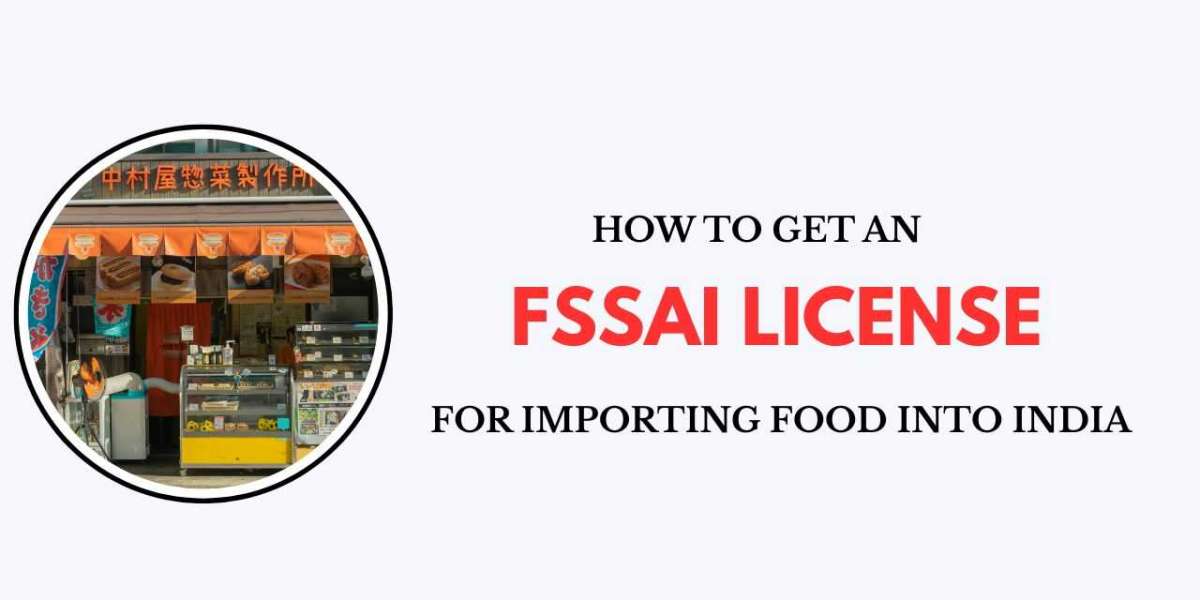If you are planning to import food products into India, one of the most crucial requirements is obtaining an FSSAI license. The Food Safety and Standards Authority of India (FSSAI) is the body responsible for ensuring the safety and quality of food products in India. The FSSAI Registration is necessary for businesses involved in importing food products, ensuring that the food products meet the safety and quality standards set by the government.
In this article, we will explain the process of applying for an FSSAI license for importing food products into India. We will break down each step in simple words, so you can understand the process clearly and complete it without any confusion.
What is FSSAI?
The Food Safety and Standards Authority of India (FSSAI) is a statutory body established under the Food Safety and Standards Act, 2006. Its primary objective is to regulate and monitor food safety in India, ensuring that food products are safe for consumption and meet the required quality standards.
The FSSAI is responsible for:
- Setting food safety standards
- Licensing food businesses
- Monitoring food quality and hygiene
- Ensuring that food products comply with the standards
FSSAI's goal is to protect public health by regulating the production, distribution, and sale of food products. Businesses involved in food-related activities in India are required to obtain an FSSAI license to operate legally.
Why is an FSSAI License Important for Importers?
If you're involved in importing food products to India, having an FSSAI license is not just a legal requirement; it is also essential for the following reasons:
- Compliance with Regulations: The FSSAI sets food safety standards that must be followed. Importing food products without a license can lead to legal issues, fines, or even the seizure of the products.
- Consumer Safety: The license ensures that the food products you import are safe for consumption and meet the necessary quality standards.
- Market Access: Many buyers and distributors in India require food products to be certified by FSSAI before they will buy or distribute them.
- Credibility and Trust: Having an FSSAI license builds credibility and trust among customers, as they know that the products are safe and quality-approved.
Types of FSSAI Licenses for Importers
When applying for an FSSAI license as an importer, it is important to know that there are different types of licenses depending on the scale of your business. The FSSAI offers three types of licenses:
1. FSSAI Central License
This license is required for large-scale businesses, including those involved in importing food products. It applies to food businesses whose turnover exceeds ₹20 crore annually. Importers of food products, including manufacturers, wholesalers, and distributors, typically require this license.
2. FSSAI State License
The state license is issued to businesses with an annual turnover between ₹12 lakh and ₹20 crore. While importers with smaller operations may fall under this category, it is less common for large-scale food importers.
3. FSSAI Basic Registration
Small businesses with an annual turnover of less than ₹12 lakh may apply for basic FSSAI registration. However, this registration is not typically applicable to importers of food products, as most importers require a state or central license.
Steps to Apply for an FSSAI License for Importing Food Products
- Visit the FSSAI Website – Start by opening the official FSSAI (Food Safety and Standards Authority of India) registration portal on your web browser. This is the first step to begin your FSSAI registration process.
- Fill in the Application Form – Once you’re on the portal, you will need to fill out the application form with details like your full name, business information, type of food products, and the category under which your food business falls. You will also need to upload essential documents like your PAN card, proof of business, and any relevant certifications.
- Review and Submit the Form – Before submitting, double-check all the details you've provided to ensure there are no mistakes. After reviewing the form, click on the submit button to proceed.
- Pay the Registration Fee – Depending on the type of FSSAI license you are applying for (Basic, State, or Central), you will need to pay a fee. This can be done online through the portal using various payment methods. Make sure to complete the payment for your application to be processed.
- Verify OTP – After payment, you’ll receive a One-Time Password (OTP) on your registered mobile number or email. Enter this OTP in the specified field on the website to complete the verification process.
- Inspection (If Required) – Depending on the nature of your food business and the license you’re applying for, officials from FSSAI may schedule an inspection of your business premises. They will verify the hygiene, equipment, and operational standards to ensure they meet the necessary food safety regulations.
- Receive Your FSSAI License – Once your application is successfully approved, you will receive your FSSAI license. This license can be downloaded directly from the portal. You can print it and display it at your business location as proof of registration.
Important Considerations for Importers
- Compliance with International Standards: If you're importing food products from other countries, make sure that they comply with the safety and quality standards set by FSSAI. This includes the use of appropriate packaging and labeling as per Indian regulations.
- Food Safety and Traceability: FSSAI mandates that food businesses establish a food safety management system to ensure that food products are safe. You must ensure proper storage, handling, and transportation of the imported products.
- Labeling Requirements: The FSSAI has strict labeling guidelines that must be followed when importing food products. Labels must include information such as the product name, ingredients, nutritional information, manufacturing date, expiry date, and the FSSAI logo with the license number.
- Customs Clearance: Importers must ensure that their products clear customs at the Indian ports. Customs clearance requires submitting documents such as the bill of entry, commercial invoice, packing list, and import license.
- Regular Renewals: The FSSAI license is valid for 1 to 5 years. It is important to apply for renewal before the license expires to continue your operations without any interruptions.
Note: Now easily Tatkal FSSAI license through the FSSAI Registration
Conclusion
Obtaining an FSSAI license for importing food products into India is an essential step to ensure that your food products meet the safety and quality standards required by law. By following the steps outlined above, you can complete the application process efficiently and start importing food products legally in India.
Remember, the FSSAI license not only ensures compliance with food safety laws but also boosts your credibility in the market, helping you gain consumer trust. Ensure that you comply with all regulations, maintain proper food safety measures, and renew your license on time to avoid any legal or operational issues.
By following the correct procedures and prioritizing food safety, you will contribute to building a successful and trusted food import business in India.



